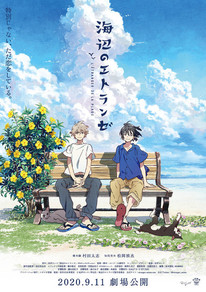Review
by Kim Morrissy,Umibe no Étranger
| Synopsis: |  |
||
The story centers on Mio, a high school boy who lost his parents at an early age. Shun, a gay aspiring novelist living near Mio's house on a remote island in Okinawa, noticed Mio sitting for hours at a bench on the beach. They grew closer to each other, but Mio had to leave Okinawa. Three years later, Mio returns to face his feelings. |
|||
| Review: | |||
I had high hopes for Umibe no Étranger ever since I saw that adorable key visual for it. You don't normally see BL anime with male character designs that are cute and round rather than lanky and sharp. I knew nothing about the story, but on a purely aesthetic level, I was attracted to this anime. I'm so glad that the character designs in motion lived up to the appeal of that key visual. This is a gentle love story with a pace that ebbs and flows like the sea tide, and that's reflected in the delicate way the characters move, especially in their tender moments. I also really love the colorful and detailed background art, which helped ground all the interactions in what felt like a real seaside neighborhood. The animation and layouts may not have been particularly ambitious, but it was attractive to look at from start to finish. The story doesn't quite live up to the appeal of its visuals, but it does have its merits. It follows the story of Shun, a gay novelist, as he struggles to overcome his uncertainties about pursuing a relationship with another man, and it's honestly quite poignant in parts. Even in the BL world, it's not typical to see stories tackling the stigma faced by gay men, which potentially gives this anime a broader appeal among people who appreciate LGBTQ themes but aren't necessarily BL genre fiction fans. While Shun's story is very solid, I can't say the same for his love interest Mio, who suffers from massive gaps in his characterization. The film begins straightforwardly enough, with Shun encountering the high school-aged Mio while he is bereaved over his mother's death. Shun awkwardly attempts to reach out and offer emotional support, and while Mio is standoffish at first, he learns to gradually open up. But before long, the plot demands that he leaves the country. Three years pass – which is only a matter of seconds in film time – and when Mio returns to the picture, his personality has done a complete one-eighty without any real explanation. The big problem with Mio is that his character lacks emotional range, and the abovementioned change is too abrupt to make him feel like a convincing person. He becomes someone with a bright and cheerful disposition, whose only goal is to be intimate with Shun. Any moments of introspection that he does get are mainly focused on his childhood memories of his mother. While those scenes are indeed touching, I really would have liked to learn more about the changes he went through during the three-year gap because those are more immediately relevant to his interactions with Shun in the present day. I also can't but feel that Yoshitsugu Matsuoka was miscast in this case, because the actor fails to portray Mio with any subtlety, choosing only to play up his cheerful side and his manzai-esque retorts. As the plot of the film goes on, Mio's character arc disappointingly fades even further into the background. When a person connected to Shun's past shows up, the rest of the film focuses almost entirely on his hangups, while Mio is relegated to the role of moral support. It quickly becomes evident that this is really more of a coming-of-age story about Shun than it is about the story of a couple. Although that story ended up being mildly interesting, if a bit stereotypical in its handling of the conflict, I ultimately came out feeling somewhat cheated because the two halves of the plot don't match each other very well. It's a shame because the intimate moments between Shun and Mio are beautifully drawn and depicted. Their beautifully animated kiss conveyed real passion and tenderness, and was miles ahead of the vast majority of anime kisses. The sex scene was a highlight as well, and I loved seeing the two boys navigate their boundaries and desires so frankly. In moments like that, they felt like a completely convincing couple, which makes it an extra pity that the story connecting these scenes feels like something from a different movie altogether. If I had to sum it up, Umibe no Étranger was... fine. I think that it needed more time to develop its characters, especially Mio, more effectively, but there were tantalizing glimpses of a satisfying love story here. The cute aesthetic, the lack of sexual assault, and the focus on overcoming internalized stigma against homosexuality makes this film easy to recommend to people who crave a gay romance anime without the baggage of old-school tropes, but I couldn't help but come out of this film thinking that it could have been something more. |
| Grade: | |||
|
Overall : B-
Story : B-
Animation : B
Art : B+
Music : B-
+ Appealing aesthetic, well-depicted scenes of physical intimacy, Shun's coming-of-age story is compelling |
|||
| discuss this in the forum (16 posts) | | |||
| Production Info: | ||
|
Full encyclopedia details about |
||